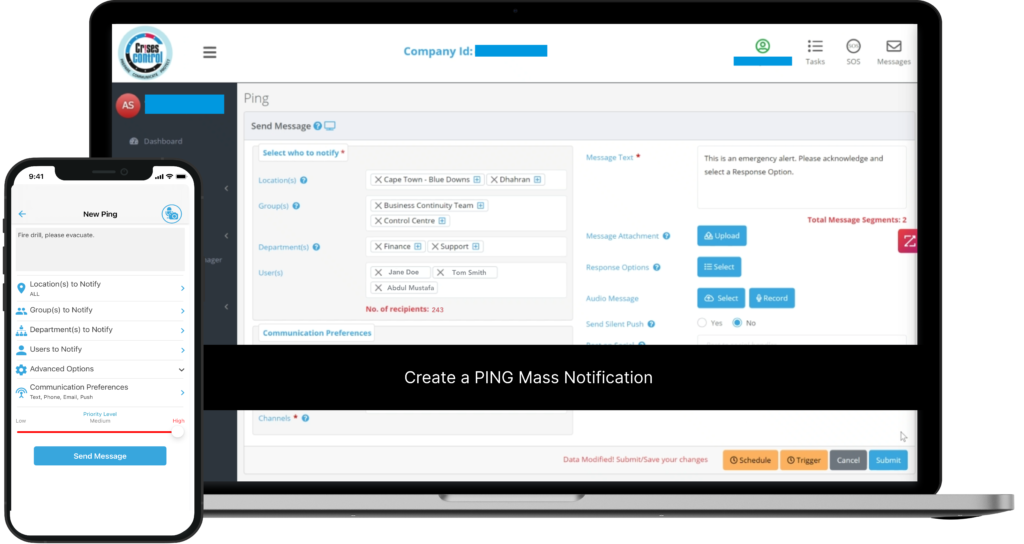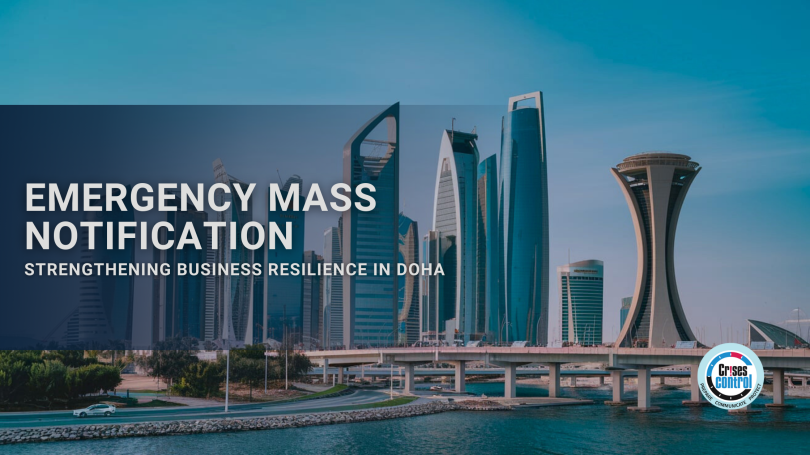Written by Anneri Fourie | Marketing Executive
In an increasingly unpredictable world, businesses in Doha face unique challenges that require swift action and clear communication. Whether it’s a sudden sandstorm disrupting operations or a major international event demanding meticulous coordination, having an effective emergency mass notification system can make all the difference. These systems not only protect lives, but also ensure businesses remain resilient in the face of disruption.
Let’s explore why emergency mass notification systems are critical for businesses in Doha, how they work, and how Crises Control can help you stay prepared for any crisis.
Why Emergency Mass Notification Systems Are Essential for Businesses in Doha
Understanding Doha’s Unique Landscape
Doha is a vibrant city, known for its rapid development and diverse economy. However, its unique environment comes with its own set of challenges:
- Extreme Weather Events: Sandstorms, heatwaves, and flash floods are part of life in Qatar. These weather events can arise suddenly, posing risks to employee safety and disrupting business operations.
- Large-Scale Public Events: Doha regularly hosts international events, from sports tournaments to global conferences. While these events bring economic benefits, they also increase pressure on transportation networks, public spaces, and local businesses.
- Stringent Safety Regulations: To operate in Qatar, businesses must comply with health and safety standards. Failure to do so can result in fines, operational downtime, or reputational damage.
The Risks of Inaction
Without an emergency mass notification system, businesses may face:
- Delayed Responses: Critical decisions take longer when there’s no efficient way to communicate with employees.
- Confusion and Miscommunication: Teams may not receive clear instructions during a crisis, leading to inefficiencies and potential harm.
- Regulatory Non-Compliance: Failing to meet Qatar’s health and safety requirements can jeopardise your licence to operate.
How Emergency Mass Notification Protects People and Operations
1. Rapid Dissemination of Information
Emergencies demand immediate action. Mass notification systems allow businesses to send alerts instantly across multiple channels, such as SMS, email, mobile apps, and voice calls. For example, if a sandstorm is approaching, employees can be informed to evacuate high-risk areas within seconds.
2. Enhancing Workplace Safety
Safety is the cornerstone of any successful business. A robust emergency mass notification system provides:
- Real-Time Alerts: Employees receive up-to-the-minute information, allowing them to make informed decisions.
- Clear Guidance: Whether it’s evacuating a building or sheltering in place, staff know exactly what to do.
- SOS Features: Employees can call for immediate assistance during high-risk situations, such as accidents on a construction site.
3. Supporting Operational Continuity
Crisis-related downtime can be costly. Mass notification systems help businesses maintain operations by:
- Coordinating Teams: Departments can collaborate effectively, even under pressure.
- Automating Tasks: Pre-configured workflows ensure critical actions aren’t delayed.
- Protecting Assets: Timely alerts help safeguard both people and property.
Why Choose Crises Control for Emergency Mass Notification in Doha
Tailored to Doha’s Needs
Crises Control is uniquely positioned to address the challenges faced by businesses in Doha. Our platform includes:
- Multilingual Support: With a workforce that speaks multiple languages, our system ensures clear communication for everyone. Crises Control currently supports English, Arabic, French, Spanish, Italian, Polish and Turkish, ensuring that all employees, regardless of their preferred language, receive vital information without confusion.
- Compliance Tools: Stay aligned with Qatar’s health and safety regulations effortlessly. Crises Control simplifies regulatory compliance in Qatar through advanced automation and detailed reporting.
Innovative Features for Maximum Impact
At Crises Control, we go beyond basic mass notifications. Our platform includes:
- Ping Mass Notification: Send instant alerts to thousands of people with just one click using our Ping Mass Notification module.
- SOS Panic Button: Empower employees to call for help when it matters most with our advanced SOS Panic Button.
- Incident Plan Builder: The Incident Plan Builder is a powerful feature of Crises Control that enables businesses to create, customise, and automate response plans for various emergency scenarios.
- Health and Safety Software Integration: Crises Control ensures that your emergency response aligns perfectly with your organisation’s safety protocols by integrating with your existing health and safety systems.
Always Available, Even in a Crisis
Unlike many systems, Crises Control operates on its own cloud infrastructure, ensuring that your notifications are always delivered—no matter what. With global cloud locations in the UK, Europe, the Middle East, and North America, we provide a resilient, high-availability solution. This means your notifications will reach their destination even if external providers experience downtime or technical issues. Our distributed cloud infrastructure enhances reliability and guarantees that your crisis management system remains operational across different regions, ensuring business continuity no matter where you are located.
Interested in our Ping Emergency Mass Notification Software?
Efficiently alert everyone in seconds at scale with our Emergency Mass Notification Software – PING, get the message out fast and ensure rapid response and recovery.

Implementing an Emergency Mass Notification System: Best Practices
- Assess Your Risks: Identify the threats most likely to affect your operations in Doha, such as weather disruptions or public events.
- Customise Notifications: Crises Control allows you to tailor alerts for different teams, ensuring messages are relevant and actionable.
- Train Your Team: Conduct regular drills and exercises to familiarise employees with the system and improve response times.
- Analyse and Improve: Use our reporting and audit tools to evaluate past incidents and refine your approach for future crises.
The Benefits of Crises Control’s Emergency Mass Notification System
For Employees:
- Increased safety and peace of mind.
- Clear, actionable communication during emergencies.
For Businesses:
- Faster response times, minimising downtime and losses.
- Simplified compliance with Qatar’s health and safety regulations.
For Stakeholders:
- Confidence in your company’s proactive risk management.
- Protection of your reputation during challenging situations.
Conclusion: Stay Ahead of Emergencies with Crises Control
In Doha’s fast-paced and ever-changing environment, businesses cannot afford to leave safety and continuity to chance. An emergency mass notification system is more than a communication tool—it’s a lifeline that protects people and operations, ensuring your organisation remains resilient in the face of any crisis.
Crises Control is here to help you implement a solution that meets your specific needs. Contact us today to book your free personalised demo and discover how we can transform your approach to crisis management.
Request a FREE Demo








